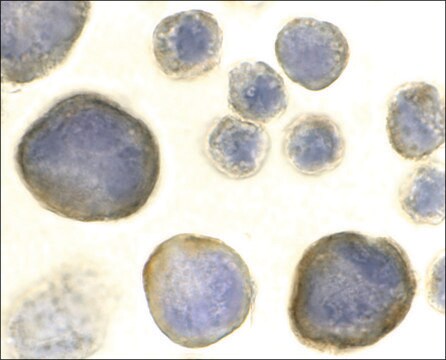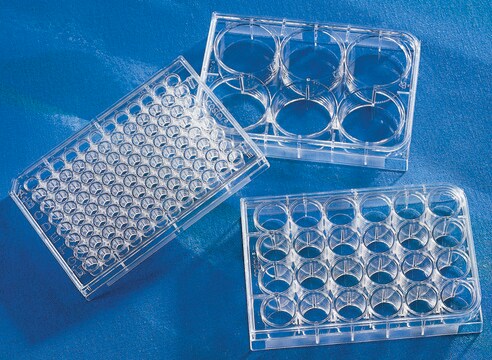WH0007852M2
Monoclonal Anti-CXCR4 antibody produced in mouse
clone 1F8, ascites fluid
Synonym(e):
Anti-CD184, Anti-D2S201E, Anti-FB22, Anti-HM89, Anti-HSY3RR, Anti-LAP3, Anti-LCR1, Anti-LESTR, Anti-NPY3R, Anti-NPYR, Anti-NPYRL, Anti-NPYY3R, Anti-WHIM, Anti-chemokine (C-X-C motif) receptor 4
About This Item
Empfohlene Produkte
Biologische Quelle
mouse
Qualitätsniveau
Konjugat
unconjugated
Antikörperform
ascites fluid
Antikörper-Produkttyp
primary antibodies
Klon
1F8, monoclonal
Speziesreaktivität
human
Methode(n)
indirect ELISA: suitable
western blot: 1:500-1:1000
Isotyp
IgG1κ
GenBank-Hinterlegungsnummer
UniProt-Hinterlegungsnummer
Versandbedingung
dry ice
Lagertemp.
−20°C
Posttranslationale Modifikation Target
unmodified
Angaben zum Gen
human ... CXCR4(7852)
Allgemeine Beschreibung
Immunogen
Sequence
MEGISIYTSDNYTEEMGSGDYDSMKEPCFREENANFNKIFLPTIYS
Physikalische Form
Rechtliche Hinweise
Haftungsausschluss
Sie haben nicht das passende Produkt gefunden?
Probieren Sie unser Produkt-Auswahlhilfe. aus.
Lagerklassenschlüssel
10 - Combustible liquids
Flammpunkt (°F)
Not applicable
Flammpunkt (°C)
Not applicable
Persönliche Schutzausrüstung
Eyeshields, Gloves, multi-purpose combination respirator cartridge (US)
Hier finden Sie alle aktuellen Versionen:
Analysenzertifikate (COA)
Die passende Version wird nicht angezeigt?
Wenn Sie eine bestimmte Version benötigen, können Sie anhand der Lot- oder Chargennummer nach einem spezifischen Zertifikat suchen.
Besitzen Sie dieses Produkt bereits?
In der Dokumentenbibliothek finden Sie die Dokumentation zu den Produkten, die Sie kürzlich erworben haben.
Unser Team von Wissenschaftlern verfügt über Erfahrung in allen Forschungsbereichen einschließlich Life Science, Materialwissenschaften, chemischer Synthese, Chromatographie, Analytik und vielen mehr..
Setzen Sie sich mit dem technischen Dienst in Verbindung.






